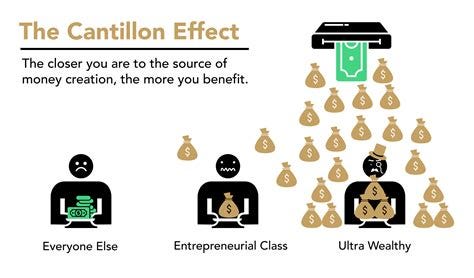In the realm of economics and finance, the Cantillon Effect refers to the uneven distribution of wealth that occurs as a result of monetary policies and the creation of new money. Stated differently, “he who is closest to the production of money pays the lowest interest rate”. The concept, named after the 18th-century economist Richard Cantillon, highlights the fact that the injection of new money into an economy doesn’t benefit all participants equally. This effect becomes even more pronounced when we consider the implications of closed source money systems, where central authorities control and manipulate the currency supply. This article explores the Cantillon Effect and its relationship to closed source money, shedding light on the potential consequences for economic inequality and the importance of transparent and decentralized financial systems.
Understanding the Cantillon Effect:
The Cantillon Effect revolves around the idea that the initial recipients of new money injections, such as governments or large financial institutions, are able to benefit from this influx before its full effects trickle down to the rest of the economy. These early recipients can use the new money to acquire assets, make investments, or engage in speculative activities, all of which can lead to wealth accumulation.
As the newly injected money gradually flows through the economy, it often results in higher prices for goods and services, which affects individuals and businesses differently depending on their access to the new money. Those at the lower end of the economic spectrum often bear the brunt of these price increases without reaping the initial benefits. This creates a widening wealth gap, exacerbating economic inequality and social disparities.
Closed Source Money Systems:
Closed source money refers to monetary systems where control over the creation and distribution of money is concentrated in the hands of a centralized authority, such as a government or a central bank. These entities have the power to manipulate the money supply, set interest rates, and determine monetary policies, often without full transparency or accountability.
In closed source money systems, the Cantillon Effect can be magnified due to the ability of central authorities to allocate money in a manner that suits their own interests or benefits specific groups or industries. Lack of transparency and the potential for corruption can further deepen the impact of the Cantillon Effect, as the public may be unaware of the extent of manipulation or favoritism occurring behind closed doors.
The Importance of Transparent and Decentralized Financial Systems:
In contrast to closed source money systems, open and decentralized financial systems, such as the Bitcoin Time Chain, offer the potential for greater transparency, fairness, and reduced Cantillon Effects.
Bitcoin’s base layer is censoreship resistant, extremely resilient to change and coercion, and with a hardcap monetary supply of 21million, the monetary policy is set in stone since inception and accessible to verify by all participants of the network. The creation and distribution of new currency units are predefined and independent of any central authority, ensuring a more level playing field for economic actors.
By utilizing the Bitcoin distributed and decentralized monetary network, individuals have the opportunity to participate in the creation of money within the spectrum of its monetary supply schedule and promote a more inclusive and fair global economy. Transparent monetary policies and open-source technology enable greater scrutiny and accountability, reducing the potential for concentrated wealth accumulation and manipulation.
I conclude, the Cantillon Effect serves as a reminder of the unequal distribution of wealth that can arise from monetary policies and closed source money systems. By understanding this phenomenon, we can appreciate the importance of Bitcoin and how it mitigates the potential for concentrated wealth accumulation and promote economic fairness. The Bitcoin network is an alternative to closed source money, providing individuals with complete control over their financial lives, if used correctly, and fostering a more equitable economy.
As we navigate the future of finance, it is crucial to embrace transparency, decentralization, and inclusivity to counteract the negative consequences of the Cantillon Effect and strive for a more just and balanced economic system.




